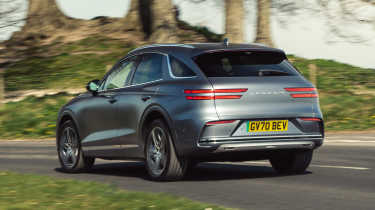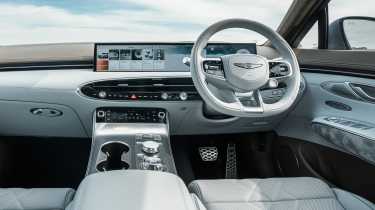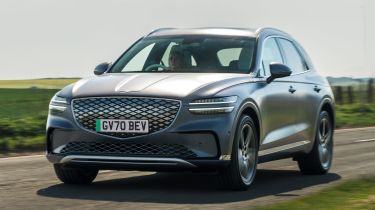Genesis Electrified GV70 review
The Genesis Electrified GV70 isn’t the most complete EV, but it is one of the most distinctive and interesting, which means a lot in our new-age electric era

Our opinion on the Genesis Electrified GV70
Most rational minds will note the mediocre range figure and look towards more efficient German rivals, but this new Genesis Electrified GV70 has plenty to offer. A superb cabin, excellent tech and impressive straight-line speed are all strong points, but it’s the new ‘virtual gear shift’ feature which completely steals the show, creating a more engaging, and distinctive, driving experience than in any rival EV.
| Key specs | |
| Fuel type | Electric |
| Body style | SUV |
| Powertrain | 2x e-motor, 84kWh battery |
| Safety | 5* |
| Warranty | Five years |
About the Genesis Electrified GV70
For the first time in over two years, we can say there’s a new Genesis on sale in the UK, because the quirky Korean luxury car brand has given its Electrified GV70 a significant overhaul.
Designed to sit in the market just below mid-sized all-electric German SUVs like the Porsche Macan and Audi Q6 e-tron, plus impressive newcomers such as the Polestar 3, it has a tough crowd of competitors that, unfortunately, leave the GV70 trailing when it comes to potential range figures.
That’s because despite having a new, larger battery pack (84kWh net) than before, the GV70 still doesn’t quite crack the 300-mile mark. Its 298 miles is a figure many of its rivals will comfortably reach, even with entry-level battery packs. Despite this the Genesis hits back with something that few, if any, rivals offer – true distinctiveness and engagement courtesy of some really fascinating tech. We’ll explain more below.
If you're interested in getting yourself a Genesis Electrified GV70, we can help. Configure your ideal Genesis Electrified GV70 now to get top offers from local dealers, check out the latest Genesis Electrified GV70 leasing deals or search for used Genesis Electrified GV70 models with our Find A Car service. You can even sell your existing car for a great price with Auto Express Sell My Car.
Performance & driving experience

| Pros |
|
| Cons |
|
On the road, the GV70 is actually quite nicely set up. The steering is well weighted and accurate, if lacking in any real feedback, and paired with a brake pedal that does a good, if not class-leading job of blending regenerative braking and friction braking.
The throttle pedal also responds consistently and makes smooth driving easy, plus there are ‘Eco’ and ‘Sport’ modes that either prioritise efficiency or give the powertrain some extra pep. Plus there’s a ‘Boost’ button on the steering wheel, which will give the full 483bhp kick for a limited period of time, making the GV70 much faster than it really needs to be on a day-to-day basis.
The only significant black mark in terms of on-the-road behaviour is poor ride quality on models running the larger 20-inch wheels; it’s just too firm on particularly rough or undulating roads. However, it’s clear this is to the benefit of the handling, which is tidy and well controlled – something that’s difficult to achieve without an inherently firm set-up on big electric SUVs.
However, while all of these dynamic attributes make up a quite satisfying driving experience, this mid-cycle update has also brought with it a fascinating new feature. Derived from the system Hyundai uses to transform the Ioniq 5 into the brilliant 5 N, Genesis has integrated a ‘virtual gear shift’ or VGS mode that doesn’t just mimic an internal combustion engine in terms of sound, but also maps the torque, and therefore feel, of a combustion engine and eight-speed automatic transmission.
It might sound like a gimmick, yet it does a brilliant job of feeling just like a big, torque-rich V6 engine with an accompanying burble that’s only audible from inside the cabin. One of the key elements helping to give a ‘premium’ feel in this class is the sound of a large multi-cylinder engine, so the ability to recreate one so faithfully gives this all-electric GV70 something that its four-cylinder combustion-engined counterparts – and many EV rivals – don’t have: a feeling of gravitas.
If you drive the Genesis hard and ‘rev’ the virtual engine to its extremes, it loses some of its authenticity due to an overly computerised sound at the top end, but at normal speeds the gentle flow of cycling through gears is hugely satisfying for anyone who misses the feel of ICE cars, but has chosen to switch to an EV. And if this fakery, brilliantly executed though it is, doesn’t appeal, it can be easily switched off.
Performance, 0-60mph acceleration and top speed
Genesis has taken the decision to offer the Electrified GV70 with one very high-performance powertrain option that puts it way up the list in terms of outright performance. This is made up from a dual-motor set-up, with one e-motor on each axle, which are even in terms of power, but rear-biased in terms of delivery.
In most cases, the front motor will lie dormant under normal driving, only kicking in under hard acceleration and when in one of the more off-road-biased driving modes.
The peak figures are 483bhp, with 700Nm of torque, which are sent to all four wheels via a single-speed transmission at both ends. Maximum regenerative braking power is 170kW.
| Model | Power | 0-60mph | Top speed |
| Genesis Electrified GV70 | 483bhp | 4.4s | 146mph |
Range, charging & running costs

Despite having a new, larger battery pack (84kWh net) than before, the GV70 still doesn’t quite crack the 300-mile mark, which is not great. Its 298 miles is a figure many of its rivals will comfortably reach, even with entry-level battery packs.
To help combat its relatively limited range, the GV70 does offer some very impressive charging stats thanks to its 800V electrical system. This will see a top-up time of just 19 minutes from 10-80 per cent, which is right up there with rivals from Audi and Porsche, and better than those of more expensive BMWs or Mercedes.
| Model | Range | Peak DC charging | Insurance group |
| Genesis Electrified GV70 | 298 miles | 270kW | 50 |
Interior, design & technology

| Pros |
|
| Cons |
|
It might not appear obvious, but a close look at the new GV70’s cabin reveals a substantial overhaul to both the layout and design. In order to fit the new screen, the dashboard has been entirely replaced, paired with a more practical centre console. This now integrates seamlessly into the dash, rather than falling beneath it, and houses a larger and easier-to-use climate control interface. There’s still a wide selection of physical controls to supplement the touchscreens, and while the whole set-up can be a bit bewildering at first, with some time to acclimatise, it does all come to hand.
Infotainment, sat-nav and stereo
The reason for such a big change to the dash is the need to house a huge new OLED display that stretches across the dashboard. Unlike the layouts in an Audi or BMW, this isn’t two separate displays that sit under one housing, but rather one giant screen that’s impressively clear and bright. As a result, users can more comprehensively personalise the layout, such as having the main map view bleed seamlessly into the driver’s eyeline.
To use, the new system is a little complex, but it does get easier over time. The main menu structure gives you access to most functions, but for deeper functionality, the system can require a few too many pushes and prods into various menus. The screen’s amalgamation also means some of the distinction between controls can be a little messy.
Do the steering wheel buttons control both the bit in front of you and to the side? Is the click-wheel able to control the left-hand side of the driver’s section? It’s definitely something that needs time to be learned and eventually customised to your preferences; once this is done, we have no doubt it’ll be straightforward to get your head around.
Genesis has partnered with Bang & Olufsen for the sound system, and it’s very good, with a rich sound and plenty of customisation. The embedded navigation system is also pretty clear, but we found that phone mirroring – though easy to access – seemed to be at odds with the single-screen graphics, losing that ability to treat the one display as one display.
Boot space & practicality
| Pros |
|
| Cons |
|
Interior space is good enough considering the external dimensions. Head, leg and kneeroom in the second row is decent for two, if a little pinched for three, and the main 503-litre luggage space is square and equipped with a solid parcel shelf and lots of handy tie-down points. Flip the second row of seats down and you’ll have a nearly flat loadbay.
The relatively wide body does mean that the second row feels roomy across all three seats, and with the help of an optional sunroof and the light-coloured headlining of cars with a cream interior, it’s all very serene. For a sportier effect, the darker coloured interiors do a good job, but it lacks the overall space and versatility of some rivals – especially those with a bespoke EV platform below, such as the Polestar 3 or Audi Q6.
|
Dimensions | |
| Length | 4,715 |
| Width | 1,910 |
| Height | 1,630 |
| Number of seats | 5 |
| Boot space | 503-1,678 litres |
Dimensions and size
At just over 4.7m long, the GV70 sits in a space between medium and large premium SUVs. This makes it a little bigger and more spacious inside than something like a BMW iX3, but not to the extent of the much wider iX. Some might find this a boon compared to cars like the former BMW rival, but you can’t deny that rivals with a bespoke EV architecture are more flexible and spacious in context to their direct rivals. The BMW iX and Polestar 3 are extreme examples of cars, albeit priced somewhere above, which have significantly more rear legroom.
Boot space
The boot, on the other hand, is perfectly usable considering the exterior dimensions. A 503-litre capacity is about right for the class, and this increases to 1,610 litres with the second row folded. There’s no third row option, and while there is some space underneath for a charge cable, it lacks a ski hatch to allow four-up travel with skis in the back.

Towing
Genesis rates the Electrified GV70 at 1,800kg with a braked trailer, or 750 without a braked trailer.
Reliability & safety
| Pros |
|
| Cons |
|
Genesis quotes a five-star Euro NCAP safety rating for the pre-facelift model and we have no reason to believe the latest version is any less accomplished. In terms of reliability, Genesis’ relatively recent addition to the UK market means data is limited, but the brand includes a Genesis personal assistant, plus valet servicing.
This will see Genesis collect your car from anywhere in the UK, leave you with a loan vehicle and then return it, cleaned, whenever it’s ready. This extends to roadside assistance, and means that should there be any issue with your Genesis, you will have constant access to help to resolve any issues.
This sort of service just isn’t possible from most premium rivals given their scale, and is a hugely attractive ownership element to any new Genesis.
| Key standard safety features |
|
| Euro NCAP safety ratings |
|
Buying and owning
- Best buy: Genesis Electrified GV70 Pure trim level
We’d suggest that the entry-level model is likely your best bet for the GV70, as while it lacks a few of the high-end toys, its fundamentals are all there, while it usefully undercuts its most advanced rivals in price. At a touch under £65,000, this represents a large amount of car for the money, and with models like the BMW iX and Polestar 3 nearly £10,000 higher in price, the gap for the GV70 to occupy is big enough for it to be a real contender.
Genesis Electrified GV70 alternatives
If you are tempted by the higher-specification models, or want to add a few options such as high-grade leather or a sunroof, really good rivals like the BMW iX and Polestar 3 are just too close in price and offer a considerably more polished package.
And this gap at the low end of the range won’t last forever, as BMW and Mercedes are both on the cusp of all-new mid-size premium SUV rivals on bespoke EV platforms that will easily show up the Genesis and its non-bespoke basis.
Latest deals on the Genesis Electrified GV70 and rivals
Genesis Electrified GV70 pictures
Frequently Asked Questions
Yes





